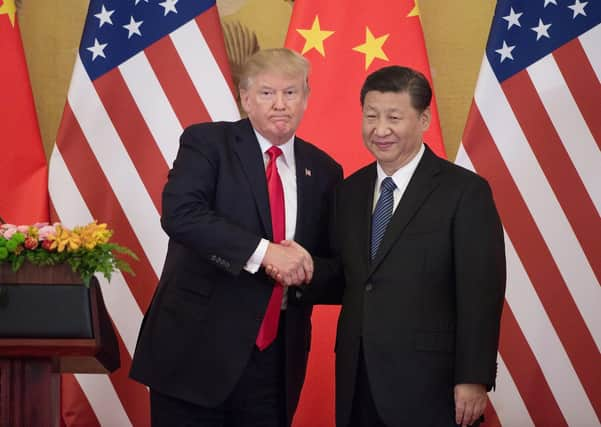Global fragmentation another symptom of Covid pandemic – Marco Vicenzino


As the post-pandemic global order emerges, fragmentation looms large across the geopolitical landscape. The US-China rift will widen as Beijing confronts American global influence and Asian neighbours head-on while exploiting weaknesses in Europe and much of the developing world.
Despite confronting the triple onslaught of a public health pandemic, economic crisis and spiralling racial tensions, America’s bipartisan consensus against China will endure any potential change of presidential administration or legislative leadership after the 2020 elections. Furthermore, this sentiment will be increasingly backed by broad-based popular support and justified by America’s foreign policy establishment.
Advertisement
Hide AdAdvertisement
Hide AdUnder President Xi Jinping, the Communist Party aggressively reinforces the perception of national unity at home and abroad. This was recently underlined at China’s annual parliamentary gathering. Apart from quelling domestic dissent, the party is actively exerting enormous diplomatic and economic pressure on overseas criticism.
China recently imposed punitive tariffs on Australia after it successfully led efforts for a majority vote at the World Health Organisation for an international inquiry into Covid-19’s origins and global response. Fundamentally, China wants Australia and other Pacific nations to recognise its regional supremacy in both words and actions.
However, regional resistance is mounting. Vietnam, Malaysia and Indonesia keep up pressure on Chinese claims in the South China Sea, as does Japan in the East China Sea. Australia consistently holds its ground against China on several fronts.
Despite boasting the world’s largest democracy, India has yet to fulfil its potential at home or abroad. Internal challenges continue to obstruct its evolution. Its Covid-19 prospects and economic fallout appear grim. Regionally, India is consistently overshadowed by China’s rapid growth and influence on its doorstep and the broader Asia-Pacific.
In the new geopolitics, India requires a serious course correction. It must upgrade its diplomacy and accelerate its regional engagement and integration. Otherwise, it risks long-term secondary regional status with limited, if any, global reach.
The recent India-Australia military agreements - aimed largely at countering China’s rapid regional expansionism – were a major step in the right direction. However, overall, India remains behind the curve in its historic rivalry with China and assuming its proper regional role.
The Covid-19 pandemic presents the European Union with its greatest existential crisis since its inception in 1957. More than ever, its internal weaknesses and divisions are prey for exploitation by China and other global players. European unity is required to ensure the union’s survival.
In a recent EU report on disinformation in the pandemic, Chinese pressure succeeded in the removal of language accusing China of running a “global disinformation campaign to deflect blame” on Covid-19’s spread. Further interference and manipulation of Europe’s internal challenges can be expected.
Advertisement
Hide AdAdvertisement
Hide AdIn the emerging world order, Russia will continue aggressively pursuing its own independent global agenda, despite often siding with China at the UN Security Council in light of certain converging interests. Overall, Russia aims to avoid a subservient role to China or dependence on the West and prevent itself from being played as a geopolitical card to either side’s advantage.
Although lacking overwhelming economic firepower, Russia’s vast natural resources, nuclear arsenal and willingness to project military power abroad – whether in Syria, Libya, along its immediate borders or in former Soviet lands – will still guarantee it a place at the table of great powers.
Furthermore, despite the steep global oil price drop and the fact Russia has been hard hit by Covid-19, President Vladimir Putin is determined to maintain control at any cost. Proposed constitutional changes could keep him, or at least one of his underlings or inner circle members, in power until 2036.
Until now, Turkey has defied the worst of expectations. It will continue to reassert its influence, often defying other major powers, particularly in former Ottoman domains of its near abroad.
Whether drilling oil in disputed waters in the Eastern Mediterranean Sea, engaging in quasi-direct conflicts with Russia in Libya or Syria, or vying for influence against Saudi Arabia and the UAE in the Gulf region or broader Middle East, Turkey will go its own way despite Nato membership. It will not hesitate to flex its muscles whenever possible as a determined regional player at a strategic global crossroads.
After years of pursuing ambitious regional expansion and proxy wars, Iran has overreached. Crippling US sanctions and Covid-19’s economic fallout will sober, but not completely stall, Tehran’s regional agenda.
It remains a historic and real regional power to be reckoned with. It will grow closer to China and continue to challenge America’s presence, and its allies, in the Middle East.
The general failure by many regional powers in Latin American and Africa to provide meaningful leadership at home, or in their broader neighbourhoods, has created power vacuums skilfully filled by China in the past two decades. Like many other trends, the Covid-19 fallout may only accelerate this process.
Advertisement
Hide AdAdvertisement
Hide AdMarco Vicenzino ([email protected]) is a geopolitical expert and international business advisor to senior executives. He is also a Euromoney Country Risk Expert and member of the International Advisory Council of the Asia Scotland Institute
Comments
Want to join the conversation? Please or to comment on this article.